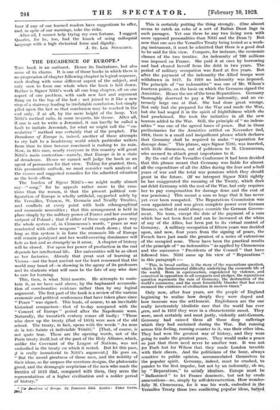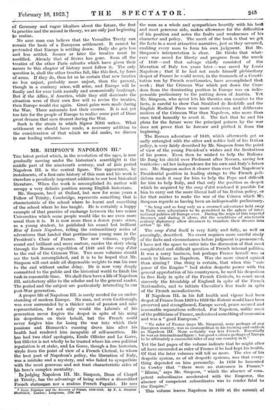THE DECADENCE OF EUROPE.* Tins book is an outburst. Hence
its limitations, but also some of its charm. It is one of those books in which there is no progression of chapter following chapter in logical sequence, each dealing with some different aspect of the subject, and only seen to form one whole when the book is laid down. Rather is Signor Nitti's work all one long chapter, all on one aspect of one problem, with each new fact and argument flung on to the top of the last : not joined to it like a new step of a stairway leading to irrefutable conclusion, but simply piled upon the last so that conclusion may be reached in the end only, if at all, by the mere height of the heap. Yet Nitti's method suits, in some respects, his theme. After all, if one is out to write a Jeremiad, it can hardly be called a fault to imitate Jeremiah, for what we might call the " cu- mulative " method was certainly that of the prophet. The Decadence of Europe is, indeed, another of those attempts to cry halt to a headstrong world which particular writers from time to time become convinced is rushing to its ruin. Now, in this case, nearly everyone in this country will grant Nitti's main contention—namely, that Europe is in a state of decadence. Hence we cannot well judge the book as an agent of persuasion for that view. Taking for granted, then, this pessimistic outlook, we must consider such analysis of the causes and suggested remedies for the admitted situation as the book offers.
The burden of Signor Nitti's—we might really almost say—" song," for he appeals rather more to the emo- tions than the reason, is that the present political con- figuration of Europe is wholly artificial, supported solely by the Versailles, Trianon, St. Germain and Neuilly Treaties, and conflicts at every point with both ethnographical and economic necessities ; that this arrangement is held in place simply by the military power of France and her essential outpost of Poland ; that if either of these supports gave way the whole system of, in Clemenceau's words, " peace as war conducted with other weapons " would crash down ; that so long as this system is in force the economic life of Europe will remain paralysed and her world-covering dominance will fade as fast and as strangely'as it arose. A chapter of history will be closed. For upon her power of production in the end depends her intellectual life. Her universities will be as silent as her factories. Already that great seat of learning at Vienna—not the least ancient nor the least renowned that the world may boast of—is showing in the agony of its professors and its students what will soon be the fate of any who dare to care for learning.
This, then, is what Nitti asserts. He attempts to main- tain it, as we have said above, by the haphazard accumula- tion of corroborative evidence rather than by any logical argument. The first part of the book is a review of the various economic and political conferences that have taken place since " Peace " was signed. This leads, of course, to an inevitable
historical comparison—that of to-day compared with the " Concert of Europe " period after the Napoleonic wars. Naturally, the twentieth century comes off badly: "Those who drew up the treaty (that of 1815) were men of the old school. The treaty, in fact, opens with the words Au nom de la tag Sainte et indivisible Trinite." [That, of course, is not quite true. These are the opening words, not of the Paris treaty itself, but of the pact of the Holy Alliance, which, unlike the Covenant of the League of Nations, was not embodied in the treaty on which it rested. But let this pass, it is really immaterial to Nitti's argument.] He goes on, " But the moral greatness of those men, and the nobility of their ideas, so far surpass the covetous designs, the plutocratic greed, and the demagogic scepticism of the men who made the
treaties of 1919 that, compared with them, they seem the
representatives of a higher civilization and a nobler period of history."
• no Dorado:ice of Europe. By Francesco BUM London : Fisher Unwin.
1103-3) _ . .
This is certainly putting the thing strongly. (One almost seems to catch an echo of a sort of Italian Dean Inge in such passages. Yet can there be any two living men with more opposed personalities than Nitti and the Dean ?) But now that one sees the Versailles Treaty being tested as a work- ing instrument, it must be admitted that there is a good deal
to be said for this view. Compare, for instance, the economic clauses of the two treaties. An indemnity of 700 millions
was imposed on France. She paid it at once by borrowing and had cleared herself from the debt in two years. The period of military occupation was fixed at five years. But after the payment of the indemnity the Allied troops were withdrawn in 1817. In 1919 no indemnity was imposed. The principle of "no indemnities" was one of Mr. Wilson's fourteen points, on the basis on which the Germans signed the Armistice. Hence the use of the term Reparations. Germany thoroughly deserved to pay a War indemnity, and an ex- tremely large one at that. She had done great wrongs. Not only had she prepared for the War and made the War, but she had waged it in the spirit of frightfulness which she had proclaimed. She took the initiative in all the new horrors added to the War. Still, the principle of " no indem-
nities " was one of the agreed bases of peace. But in those preliminaries for the Armistice settled on November 2nd, 1918, there is a small and insignificant phrase which declares
that Germany shall be required to make " reparation for damage done." This phrase, says Signor Nitti, was inserted, with little discussion, out of politeness to M. Clemenceau, who seemed to attach great importance to it.
By the end of the Versailles Conference it had been decided that this phrase meant that Germany was liable for almost all the expenditure of all the Allies during the four and a-half years of war and the total war pensions which they should grant in the future. (If we interpret Signor Nitti rightly he has exaggerated the meaning of the Treaty, which doe's
not debit Germany with the cost of the War, but only requires
her to pay compensation for damage done and the cost of war pensions.) This meant a sum so huge that it has never yet ever been computed. The Reparations Commission was soon appointed and was given complete power over German finances, so that it could always override the German Govern- ment. No term, except the date of the payment of a sum which has not been fixed and can be increased at the whim of any of the Allies, has been put to its virtual control of Germany. A military occupation of fifteen years was decided upon, and now, four years from the signing of peace, the French have just made the greatest of a series of extensions of the occupied zone. These have been the practical results of the principle of " no indemnities " as applied by Clemenceau and the successive " Presidents of the Council " that have followed him. Nitti sums up his view of " Reparations " in this paragraph :—
" This, in broad outline, is the story of the reparations question, which is the fundamental difficulty underlying the economic life of the world. Born in equivocation, engendered by violence, and conceived in opposition to all compacts and pledges, the reparations question represents the ruin of Germany, the destruction of the world's commerce, and the most formidable blunder that has ever menaced the existence of civilization in modem times."
Only now, after four years, are the people' of England beginning to realize how deeply they were duped and how insecure was the settlement. Englishmen are the one
really inveterately idealistic race that the world has ever seen, and in 1919 they were in a characteristic mood. They
were, most certainly and most justly, violently anti-German. Germany had caused them all those deep sufferings which they had sustained during the War. But running across this feeling, running counter to it, was their other idea.
They had won the greatest war of history, and they were going to make the greatest peace. They would make a peace so just that there need never be another war. It was not for Foch but for Wilson that they made London tremble with their cheers. And the politicians of the hour, always sensitive to public opinion, accommodated themselves to the popular spirit. Germany, indeed, must be crushed, to pander to the first impulse, but not by an indemnity, oh no,
by " Reparations," to satisfy idealism. Europe must be.
" Balkanized " to let France dominate, but not by crude annexations—no, simply by self-determination. How wonder- fully M. Clemenceau, for it was his work, embodied in the
Versailles Treaty these two conflicting popular ideas, hatrd
of Germany and vague idealism about the future, the first in practice and the second in theory, we arc only just beginning to realize.• - No sane man can believe that the Versailles Treaty can =main the basis of a European settlement. It cannot be pretended that Europe is settling down. Daily she gets less and less settled. Sooner or later the treaties must be modified. Already that of Sevres has gone. Soon all the treaties of the other Paris suburbs which have given their names to this chapter of history must follow it. The only question is, shall the other treaties fall, like this first, by force of arms. If they do, then let us be certain that new treaties no less unjust, probably more unjust, than the present, though in a contrary sense, will arise, and Europe will be finally and for ever both morally and economically bankrupt. But if the Allies, if America, while they still dominate the situation were of their own free will to revise the treaties, then Europe would rise again. Great gains were made during the War. Three autocrats lost their crowns. It is not yet too late for the people of Europe to realize some part of those great dreams that men dreamt during the War.
Such is the strain in which Signor Nitti writes. What settlement we should have made, a necessary addition to the consideration of that which we did make, we discuss in our leading columns.



































































 Previous page
Previous page